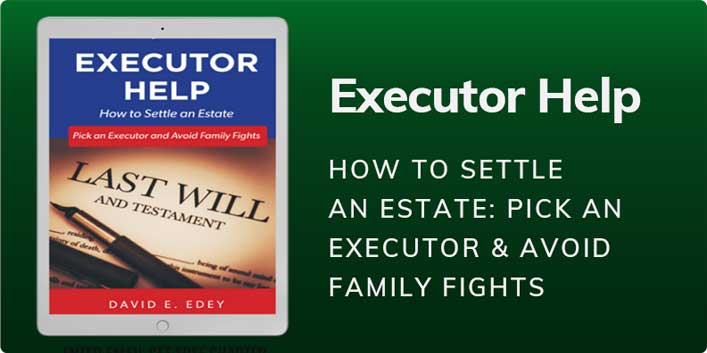- Home
- Becoming executor of estate
- Executor Problems with Beneficiares
Do you have executor problems with beneficiaries? Here's 7 things you can do!
Don't be surprised if you have executor problems with beneficiaries.
Whatever your reason for agreeing to be an executor—whether
out of a sense of duty or honor—this is likely the one and only time in your life that you will be called upon to do such a thankless job.
Why thankless? If all goes well, it will be seen by the beneficiaries as having been no big deal for you to do.
But when there executor problems with beneficiaries it won't matter as you’ll likely be targeted for some or all of their discontentment, possibly even resentment.
Accepting to be an executor is typically a very personal choice that a testator (one who makes the will) makes, putting their trust in that person or people to properly and fairly settle their estate.
This is not something that we’re routinely called upon to do because most of us don’t have the professional training.
Dealing with lawyers, accountants, real estate agents, and financial advisers all takes a lot of time and effort.
There’s a lot of paperwork involved. So there has to be strong motivation to agree to do all this.
Plus, there are the beneficiaries. They could be wonderful, or they could soon have you asking why you ever agreed to all this
Executor problems with beneficiaries can make your life
easy or become your biggest nightmare
You won't have executor problems with beneficiaries who are reasonable people and in no big hurry to obtain their inheritance only need to be kept informed regularly by you as to how the estate’s settlement is progressing.
You could keep these beneficiaries up to date through an email, teleconferencing session, or online virtual meeting every one or two weeks.
The key is to communicate. If reasonable people are made aware of the steps and the realistic timing for their completion, they will likely be more patient with the process.
Any unforeseen delays or circumstances should be promptly related so that they can adjust their expectations.
While clear communications may seem to be a simple process, you need to be prepared to deal with a difficult beneficiary.
Too often, there are people who are unrealistically impatient with the process, angered that they weren’t put in charge of the estate, believe they are entitled to more than what’s been designated to them, and willing to be manipulative in an attempt to gain a bigger share or property or an item they deem should belong only to them.

Some people are naturally difficult, even argumentative, no
matter what. You must always be prepared for anything. It’s amazing how
people change—show a totally different side of themselves—when there is an inheritance.
Many want their inheritance as soon as possible. They are not interested in the process you must follow to settle the estate.
As mentioned, some feel they should be entitled to more than what has been designated to them.
Your biggest executor problems with beneficiaries are with the difficult and entitled individual who are most likely to want to take you to court.
So how to deal with difficult beneficiaries?

1. Make it clear that you will be following the will’s instructions exactly as written.
2. Emphasize that you cannot possibly change any aspects of the will even if you thought doing so would make the estate’s settlement fairer to everyone because that could expose you to a potential lawsuit.
3. Let them know that it is your goal to settle the estate within one year.
4. State at the outset (and confirm same in a written letter or email) that you will not under any circumstance pay out any money from the estate until all of the deceased’s taxes have been paid and you have received tax clearance certification from the Canadian government. In the US, you will not pay out any money until you have gotten a judgment from the probate court.
5. Let them know you will be keeping them informed every week to two weeks, either by email, a scheduled teleconference, or virtual online meeting.
6. Let them know you will not allow any personal or household items to be taken before the estate is settled or given to anyone who is not named in the will.
7. Some ways to resolve a fight between two beneficiaries if they both want the same item is to flip a coin or have a vote by all the beneficiaries. If you can’t get an agreement, suggest putting the item up for sale with the profits equally divided among all of the beneficiaries.
Your responsibilities as executor are limited to having the estate properly settled as quickly as possible, keeping the beneficiaries informed from the outset about what each is entitled to receive, and providing updates every week or two about your progress in concluding the estate’s affairs.
Follow these tips and you will avoid executor problems with beneficiaries.
- Home
- Becoming executor of estate
- Executor Problems with Beneficiares






